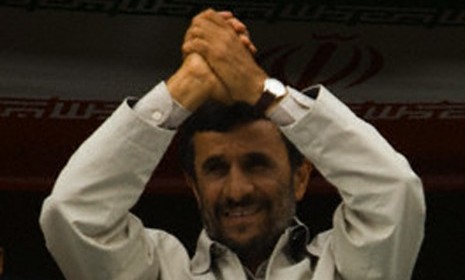Is Iran really a 'nuclear state'?
Mahmoud Ahmadinejad claims his country could build an A-bomb, but doesn't want to. Is he bluffing?

A free daily email with the biggest news stories of the day – and the best features from TheWeek.com
You are now subscribed
Your newsletter sign-up was successful
Heating up a stand-off with the West, Iranian President Mahmoud Ahmadinejad boasted Thursday that his country had become a "nuclear state," with the capacity to enrich uranium pure enough to make a nuclear bomb if it wanted. The White House, which is expanding sanctions against Tehran, said Ahmadinejad's claims were "based on politics, not physics," because Tehran's defiance is popular at home. Is Iran really a "nuclear state," or is Ahmadinejad making empty threats? (Watch an AP report about Iran becoming a "nuclear state")
Ahmadinejad is bluffing: Mahmoud Ahmadinejad's "nuclear state" claim "is almost certainly bravado," says Graham Usher in Egypt's Al-Ahram Weekly. But it suggests that both Tehran and the Obama administration have shifted from "engagement to confrontation." That might make it easier to get foreign powers to unite behind sanctions that will really bring Tehran to its knees.
The Week
Escape your echo chamber. Get the facts behind the news, plus analysis from multiple perspectives.

Sign up for The Week's Free Newsletters
From our morning news briefing to a weekly Good News Newsletter, get the best of The Week delivered directly to your inbox.
From our morning news briefing to a weekly Good News Newsletter, get the best of The Week delivered directly to your inbox.
Ahmadinejad exaggerates, but Iran is getting closer to the bomb: "Incompetence, sabotage, and other factors can still slow Iran down," says John Bolton in The Wall Street Journal. But Tehran's march toward building nuclear weapons continues, and eventually it will get there. Ahmadinejad's defiance only strengthens the case that a military strike is the only solution.
"The case for striking Iran grows"
Maybe a nuclear-armed Iran wouldn't be such a bad thing: Iran is enriching nuclear fuel to a higher level, says Adam B. Lowther in The New York Times. If it does manage to build a bomb, it's neighbors -- not the U.S. -- will be the ones at risk. That might increase everybody's eagerness for Middle East peace and create a "new regional dynamic strikingly like that of cold-war Europe."
A free daily email with the biggest news stories of the day – and the best features from TheWeek.com
The threat of a nuclear Iran isn't as urgent as most think: Iran won't drop its nuclear program even if pro-Western reformers take over -- it's a matter of "national pride," says Fred Kaplan in Slate. But if Iran's enriching uranium to the level of 20 percent, as Ahmadinejad claims, it's still years away from building an A-bomb. It's nutty to think a nuclear Iran would be a good thing, but the threat is more remote than all sides -- whether they want sanctions, negotiations, or war-- care to admit.